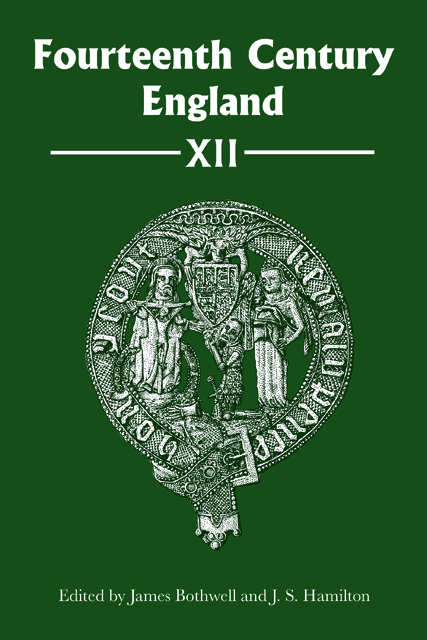Book contents
- Frontmatter
- Contents
- List of Illustrations
- List of Contributors
- Preface
- Abbreviations
- The King’s Confessors and the Royal Conscience in Late Medieval England
- ‘Such maintenance as …’: Corrodies of the Crown
- ‘Vos maisons sount pris al eops le counte’: Walter Bedwyn, Treasurer of York, and the Return of Piers Gaveston
- The Deposition of Edward II: The Kenilworth Embassies
- The English Parliament and the Trial of the ‘Peers of the Land’ in Henry of Lancaster’s Revolt (1328–29): The Origins of a Privilege
- A Brotherhood Uncovered: Investigating the Knightly Following of Thomas Beauchamp, earl of Warwick, 1329–69
- The Black Death and Clerical Prospects in England
- The Last of the Duketti? Richard II, Henry of Monmouth and the House of Lancaster
- Confusion Confounded? The Contrasting Military Fortunes of Sir William Neville (d. c.1391) and Sir William Neville of Pickhill and Rolleston (d. c.1420)
A Brotherhood Uncovered: Investigating the Knightly Following of Thomas Beauchamp, earl of Warwick, 1329–69
Published online by Cambridge University Press: 11 January 2023
- Frontmatter
- Contents
- List of Illustrations
- List of Contributors
- Preface
- Abbreviations
- The King’s Confessors and the Royal Conscience in Late Medieval England
- ‘Such maintenance as …’: Corrodies of the Crown
- ‘Vos maisons sount pris al eops le counte’: Walter Bedwyn, Treasurer of York, and the Return of Piers Gaveston
- The Deposition of Edward II: The Kenilworth Embassies
- The English Parliament and the Trial of the ‘Peers of the Land’ in Henry of Lancaster’s Revolt (1328–29): The Origins of a Privilege
- A Brotherhood Uncovered: Investigating the Knightly Following of Thomas Beauchamp, earl of Warwick, 1329–69
- The Black Death and Clerical Prospects in England
- The Last of the Duketti? Richard II, Henry of Monmouth and the House of Lancaster
- Confusion Confounded? The Contrasting Military Fortunes of Sir William Neville (d. c.1391) and Sir William Neville of Pickhill and Rolleston (d. c.1420)
Summary
The field of retinue studies has gathered momentum over the last two decades. Studies about the mechanics of fourteenth-century retinues, the royal affinity, the followings of Edward the Black Prince and the Lancastrian lords have more recently been joined by work focused on the household knights of successive English kings from John to Edward III. Other recent research has sought to further our understanding beyond the royal family and the house of Lancaster, shedding light on the military retinues of other lords from Henry Beaumont to Robert Ufford and William Bohun. Thus, despite the implied or outright scepticism expressed in some quarters, there is an increasing appreciation for the presence and activity of household knights around magnates in the fourteenth century. However, many of the knightly circles surrounding the nobility in this period have yet to be explored in significant detail – remaining, in a sense, chivalric brotherhoods still to be uncovered. Doing so can not only yield specific biographical information about a magnate’s following but also shed further light on the interconnectedness of England’s chivalric elite: how one following overlapped with other affinities and how these connections operated across various domains, including judicial procedure, tournament participation, local society and military campaign.
One figure that merits closer attention is Thomas Beauchamp (1313/14–1369), the earl of Warwick in the mid-fourteenth century and a close associate of Edward III. An energetic soldier, Beauchamp was active in the Scottish campaigns of the 1330s and later in the war with France, fighting alongside the Black Prince at the battle of Crécy and subsequently becoming a founding knight in the Order of the Garter. More campaigning in France followed, with Beauchamp fighting once again with the Black Prince at the battle of Poitiers and participating in the 1359 Rheims campaign. In the 1360s he made time between his war commitments to embark on crusade, initially making plans to join Peter of Cyprus in 1364, but then voyaging to Prussia in the summer of 1365, the winter of 1365–66 and again in 1367–68. He fell ill and died in 1369 while participating in another French campaign alongside John of Gaunt.
- Type
- Chapter
- Information
- Fourteenth Century England XII , pp. 99 - 128Publisher: Boydell & BrewerPrint publication year: 2022



